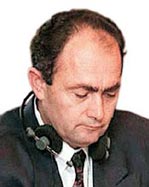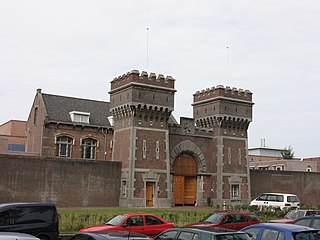
The International Criminal Tribunal for the former Yugoslavia (ICTY) was a body of the United Nations that was established to prosecute the war crimes that had been committed during the Yugoslav Wars and to try their perpetrators. The tribunal was an ad hoc court located in The Hague, Netherlands.

International criminal law (ICL) is a body of public international law designed to prohibit certain categories of conduct commonly viewed as serious atrocities and to make perpetrators of such conduct criminally accountable for their perpetration. The core crimes under international law are genocide, war crimes, crimes against humanity, and the crime of aggression.

Manjača was a concentration camp which was located on mount Manjača near the city of Banja Luka in northern Bosnia and Herzegovina during the Bosnian War and the Croatian War of Independence from 1991 to 1995. The camp was founded by the Yugoslav People's Army (JNA) and authorities of the Republika Srpska (RS) and was used to collect and confine thousands of male prisoners of Bosniak and Croat nationalities.

Zdravko Tolimir was a Bosnian Serb military commander and war criminal, convicted of genocide, conspiracy to commit genocide, extermination, murder, persecution on ethnic grounds and forced transfer. Tolimir was a commander of the Army of Republika Srpska during the Bosnian War. He was Assistant Commander of Intelligence and Security for the Bosnian Serb army and reported directly to the commander, General Ratko Mladić.

The Čelebići camp was a concentration camp run by joint Bosniak and Bosnian Croat forces during the Bosnian War where Serb prisoners were detained and subjected to murder, beatings, torture, sexual assaults and otherwise cruel and inhumane treatment. The facility was used by several units of the Bosnian Ministry of the Interior (MUP), Croatian Defence Council (HVO) and later the Bosnian Territorial Defence Forces (TO). It was located in Čelebići, a village in the central Bosnian municipality of Konjic.

Milan Lukić is a Bosnian Serb war criminal who led the White Eagles paramilitary group during the Bosnian War. He was found guilty by the International Criminal Tribunal for the Former Yugoslavia (ICTY) in July 2009 of crimes against humanity and violations of war customs committed in the Višegrad municipality of Bosnia and Herzegovina during the Bosnian war and sentenced to life in prison.
Franko "Frenki" Simatović is a Serbian former intelligence officer of Croatian descent and commander of the elite special forces police unit Special Operations Unit (JSO) from 1991 to 1998.
The Velepromet camp was a detention facility established in the final days of the Battle of Vukovar during the Croatian War of Independence. The camp was set up by the Yugoslav People's Army (JNA), which shared control of the facility with Croatian Serb rebels. The facility, originally an industrial storage site, was located on the southern outskirts of the city of Vukovar, in close proximity to the JNA barracks. It consisted of eight warehouses surrounded by a wire fence, and was established on 16 November 1991, when the first detainees were brought there.

Belgisch Park is a neighbourhood in the Scheveningen district of The Hague, Netherlands. The area has around 7,900 residents and contains many trees and the adjoining “Nieuwe Scheveningse Bosjes” and “Oostduinen”. The buildings date from the period 1870–1940. Many of the houses are expensive private residences.

People detained by the International Criminal Court (ICC) are held in the ICC's detention centre, which is located within a Dutch prison in Scheveningen, The Hague. The ICC was established in 2002 as a permanent tribunal to prosecute individuals for genocide, crimes against humanity, war crimes, and the crime of aggression. As of June 2018, it has issued public arrest warrants for 42 individuals, six of whom are currently in custody of the court.

Radovan Karadžić is a Bosnian Serb politician who was convicted of genocide, crimes against humanity and war crimes by the International Criminal Tribunal for the former Yugoslavia (ICTY). He was the president of Republika Srpska during the Bosnian War.

The Hague Penitentiary Institution is a Dutch prison that is part of the Judicial Institutions Department of the Ministry of Justice. It can accommodate more than 1,000 detainees and consists of two locations, at Zoetermeer and Scheveningen. The Zoetermeer location is for Systematic offenders and the Scheveningen location serves as a Penitentiary Psychiatric Center, the 'open design' Limited Secured Installation and Judicial Medical Center. A special independent unit in the Scheveningen location serves as a United Nations Detention Unit (UNDU) for international offenders where they remain in pre-trial detention under the responsibility of the United Nations like suspects of the International Criminal Tribunal for the former Yugoslavia (ICTY) and of the International Criminal Court (ICC).

Iain Bonomy, Lord Bonomy, is a former Senator of the College of Justice, a judge of the Supreme Courts of Scotland, sitting in the High Court of Justiciary and the Inner House of the Court of Session from 2010 to 2012. From 2004 to 2009, he was a Judge of the International Criminal Tribunal for the former Yugoslavia.

Ratko Mladić is a Bosnian Serb former military officer and convicted war criminal who led the Army of Republika Srpska (VRS) during the Yugoslav Wars. In 2017, he was found guilty of committing war crimes, crimes against humanity, and genocide by the International Criminal Tribunal for the former Yugoslavia (ICTY).

O-Gon Kwon is a South Korean jurist, best known for being one of the three judges in the trial of Slobodan Milošević. He also sat on the bench for the trial of former Bosnian Serb leader Radovan Karadžić.

The Doboj ethnic cleansing refers to war crimes, including murder, deportation, persecution and wanton destruction, committed against Bosniaks and Croats in the Doboj area by the Yugoslav People's Army and Serb paramilitary units from May until September 1992 during the Bosnian war. On 26 September 1997, Serb soldier Nikola Jorgić was found guilty by the Düsseldorf Oberlandesgericht on 11 counts of genocide involving the murder of 30 persons in the Doboj region, making it the first Bosnian Genocide prosecution. The International Criminal Tribunal for the former Yugoslavia (ICTY) classified it as a crime against humanity and sentenced seven Serb officials.

The International Residual Mechanism for Criminal Tribunals, also referred to as the IRMCT or the Mechanism, is an international court established by the United Nations Security Council in 2010 to perform the remaining functions of the International Criminal Tribunal for the former Yugoslavia (ICTY) and the International Criminal Tribunal for Rwanda (ICTR) following the completion of those tribunals' respective mandates.
Peter Robinson is an American lawyer who has defended political and military leaders at the United Nations International Criminal Tribunals. His clients include Bosnian Serb President Radovan Karadžić, Rwandan National Assembly President Joseph Nzirorera, Yugoslav Army Chief of Staff Dragoljub Ojdanic, and the lawyer for Liberian President Charles Taylor.
Zlatko Aleksovski is a former Bosnian Croat prison commander during the Bosnian War who was indicted by the International Criminal Tribunal for the former Yugoslavia and sentenced to seven years imprisonment for unlawful treatment of prisoners in Lašva Valley area in Bosnia and Herzegovina.

Gabrielle Louise McIntyre (Australian) is an international legal practitioner, jurist, and the Chairperson of the Seychelles' Truth, Reconciliation and National Unity Commission.


















